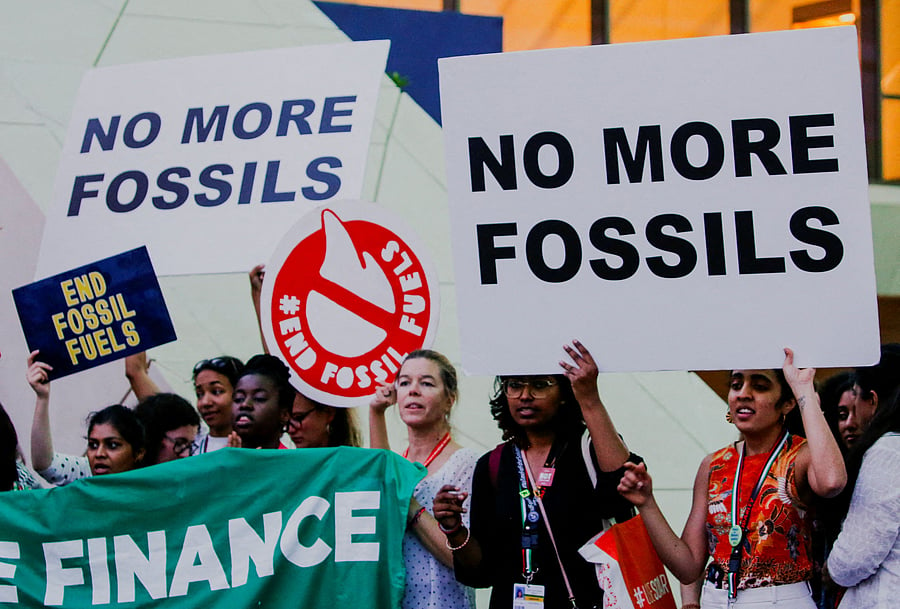
FILE PHOTO: Climate activists protest against fossil fuels at Dubai's Expo City during the United Nations Climate Change Conference COP28 in Dubai, United Arab Emirates, December 12, 2023.
Credit: Reuters photo
Mumbai: In what flags concerns about climate change, fossil fuel production by governments’ across the globe continues to steer the world further from Paris Agreement warming limits.
The 2025 Production Gap Report finds that 10 years after the Paris Agreement, governments' plan to produce about more than double (120%) the volume of fossil fuels in 2030 than would be consistent with limiting global warming to 1.5°C, and 77% more than would be consistent with 2°C.
The report has been brought out by Stockholm Environment Institute (SEI), Climate Analytics, and International Institute for Sustainable Development (IISD).
Achieving these plans would take the world further from the goals of the Paris Agreement, even as countries submit new climate commitments intended to fulfill their contributions to the pact. When this assessment was last performed in 2023, the fossil fuel production gap was 110% above the 1.5°C warming pathway and 69% more than the 2°C pathway.
“Since the 2023 analysis, governments now plan even higher levels of coal production to 2035 and gas production to 2050. Planned oil production continues to increase to 2050,” according to the report released globally on Monday.
To meet Paris Agreement goals of holding warming to well below 2°C while pursuing efforts to limit warming to 1.5°C, the world must now undertake steeper and faster reductions in fossil fuel production to compensate for lack of progress so far.
Meanwhile, governments expanding fossil fuel infrastructure waste public funds on development destined to become stranded assets.
The report assesses governments’ planned and projected production of coal, oil, and gas against global levels consistent with limiting global warming to 1.5°C or 2°C.
“In 2023, governments formally acknowledged the need to move away from fossil fuels to mitigate climate change – an obligation the International Court of Justice has now clearly emphasized,” says Derik Broekhoff, coordinating lead author of the Production Gap Report and Climate Policy Program Director at SEI’s US Center.
The 2025 Production Gap Report provides new analysis for 20 major fossil-fuel-producing
countries responsible for about 80% of global fossil fuel production: Australia, Brazil, Canada, China, Colombia, Germany, India, Indonesia, Kazakhstan, Kuwait, Mexico, Nigeria, Norway, Qatar, the Russian Federation, Saudi Arabia, South Africa, the United Arab Emirates, the United Kingdom, and the United States.
“To keep the 1.5°C goal within reach, the world needs rapid reductions in coal, oil, and gas investments, redirecting these resources toward an energy transition that prioritizes equity and justice,” says Emily Ghosh, coordinating lead author and Equitable Transitions Program Director at SEI US.
“The increase in fossil fuel expansion plans over the last two years is alarming. While many governments see renewables as key to their energy security, others are betting against the clean energy transition. To avert the worst climate impacts with minimal economic disruption, governments need to commit to no new fossil fuels and back the clean industries of the future,” said Olivier Bois von Kursk, report co-author and Policy Advisor at the International Institute for Sustainable Development.
“Ten years after Paris, renewables are way out in front of the pack. Instead of getting in the race, governments are blundering backwards towards our fossil past. While it’s frustrating seeing public money squandered on what will inevitably become stranded assets, it’s intolerably unjust to think about the human and environmental costs of these fossil expansion plans, especially for the most vulnerable,” said Neil Grant, report co-author and Senior Expert at Climate Analytics.